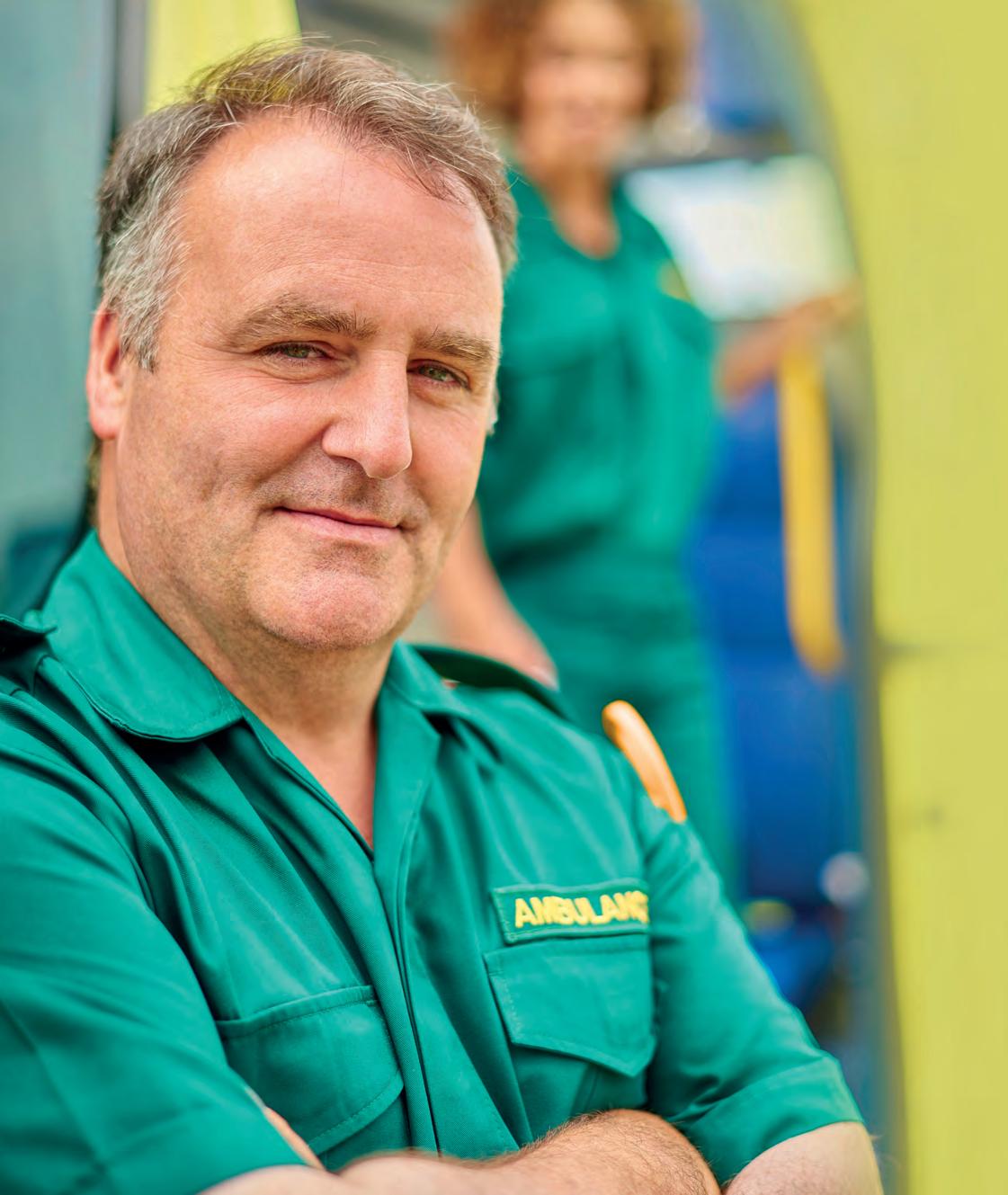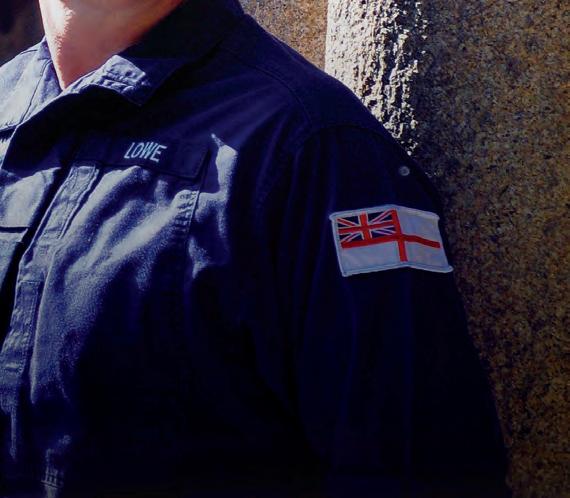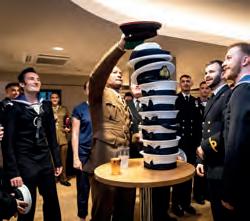

www.advancemagazine.co.uk Navigating new costs Managing your money and finding a home THE RESETTLEMENT MAGAZINE Caring for your mental health Tackling isolation and reaching out for support A career in transport Could a role in logistics be right for you? Training opportunities in the emergency services, cyber security and more CHOOSING TO RETRAIN ISSUE TWELVE WINTER 2022

AFTER YOUR NEXT BIG CHALLENGE? MAKE THE LEAP WITH CONNECT APPOINTMENTS Get the biggest and best vacancies straight to your inbox, upload your CV now at connectappointments.co.uk
PUBLISHER


Denise Connelly denise@dcpublishing.co.uk
EDITOR

Emma Storr emma.storr@dcpublishing.co.uk
DESIGN AND PRODUCTION
Lucy Baillie lucy.baillie@dcpublishing.co.uk
SALES
Marian Mathieson marian.mathieson@dcpublishing.co.uk
EDITORIAL CONTRIBUTORS
Hanna Clark

Welcome
aking the decision to transition back to civilian life can be one of the biggest choices you ever make. As you consider your options, start the resettlement process and think about your next steps a er the Armed Forces, we’re here to help every step of the way. Inside this issue, you’ll find a wealth of information, advice and support to aid you during this time.

Moving back to civvy street during a cost of living crisis can add extra stresses to an already challenging time. On page 6 we’re helping you manage your money and find guidance while looking for a new home, before providing a list of support organisations on page 28.

Contents
TRAINING
10 CHOOSING TO RETRAIN
This time is also a chance to pursue a new career in an area you haven’t explored before. Find training providers on page 10 and discover the benefits of a career in logistics on page 18.
Plus, learn how to tackle mental health problems and isolation on page 25, and fill your calendar with our pick of festive events on page 30.
Storr, Editor
SUBSCRIBE TO ADVANCE
If you’d like a free copy of Advance delivered to your door, head to our website. advancemagazine.co.uk/subscribe @AdvanceMagUK
As you return to civilian life, a training pathway can help you thrive. WORK 13 STARTING YOUR NEW CAREER
Finding support and opportunities. 16 EMBRACING OPPORTUNITIES
WITH TVS SCS

Find a new role with an employer that values your skillset. 18 A CAREER IN TRANSPORT Could a role in this industry be right for you?
OWNING A FRANCHISE The benefits of running your own business through a franchise. 23 BECOMING A RESERVIST Continue protecting your country a er resettlement.
WELLBEING
25 CARING FOR YOUR MENTAL HEALTH Reaching out during difficult times.
FEELING FESTIVE Our pick of Christmas events. SUPPORT
A HELPING HAND IN CIVILIAN LIFE Where to reach out for guidance and support.

NAVIGATING NEW COSTS How to manage your money, get help to find a home and navigate the cost of living crisis.
THE RESETTLEMENT PROCESS Understanding the different stages of this transition.
FINDING SUPPORT Use our breakdown of helpful organisations to find advice and guidance.
www.advancemagazine.co.uk 3
©DC Publishing Ltd 2022. All rights reserved. No part of this publication may be reproduced or used in any way without prior written permission from the publisher. The views expressed in this magazine are not necessarily those of DC Publishing Ltd. The publisher takes no responsibility for claims made by advertisers within the publication. Every effort has been made to ensure that information is accurate; while dates and prices are correct at time of going to print, DC Publishing Ltd takes no responsibility for omissions and errors.
ADVANCE MAGAZINE www.advancemagazine.co.uk DC Publishing Ltd, 198 Bath Street, Glasgow, G2 4HG Tel: 0844 249 9007 M
21
THE RESETTLEMENT MAGAZINE
30
4
6
9
28
6 25 18
Emma
A helping hand in civilian life
Defence Transition Services
Run by the Ministry of Defence’s Veterans UK, the Defence Transition Services (DTS) exists to provide information and support to service leavers who are likely to face challenges as they adjust to civilian life. This support extends past the service leaver themself to also help their family members. You can be referred to DTS by your unit, giving you full access to support around things like mental or physical health; drugs and alcohol misuse; finance, debt and benefits; children, family and relationships.
The service also helps with housing, accommodation and relocation, and training, education and employment. All of the support provided by the DTS is on a one-to-one basis, giving you the chance to form a connection with an adviser who fully understands your needs and what will best help you during this time.
Armed Forces Champion
Throughout the UK, Armed Forces Champions exist within local councils, NHS boards and in some workplaces. These are officials who have volunteered to support service leavers and veterans in their local area, helping to remove any barriers to support. This can come in many different forms: in local councils this can mean identifying where support exists and how it can improve; within the NHS, an Armed Forces Champion could be working on the Step into Health programme which sees service leavers work in the health service, developing or promoting an Armed Forces policy or agenda, ensuring services are accessible and suitable for service leavers, or supporting employees who have served.
Some workplaces or employers have their own champion. This is likely if they have signed the
Armed Forces Covenant and want to ensure they upkeep their commitment. Normally, people in this role have a connection to the Armed Forces or have served themselves, so if you enter your new career and find your workplace doesn’t have one, you could volunteer. Armed Forces Champions often work to support reservists within a community or workplace.
Job coach
If you aren’t sure of the industry you would like to work in next, how to put your existing skills to use, or you need help and advice ahead of the job application and interview process, a job coach could help. This could be in the form of a specialist career’s coach who understands the challenges some service leavers face on their return to civilian life, or through someone in a Jobcentre Plus who specialises in helping people who are currently unemployed.
Often, job boards specific to the Armed Forces community have advisors or coaches who can give tailored support and advice. Hire a Hero (www.hireahero.org.uk) have Career Coaches, many of which have a military background, to support people into work.
FIND OUT MORE
For further support and guidance, contact a dedicated charity like SSAFA (www.ssafa. org.uk) or the Royal British Legion (www.britishlegion.org.uk)
4 www.advancemagazine.co.uk SUPPORT
The return to civilian life can feel confusing and overwhelming at times. Reaching out for guidance and support can aid you during this process and ensure a positive transition
“This support can extend past the service leaver themself to also help their family”
ARE YOU READY TO MAKE A DIFFERENCE?



After serving in the Royal Navy for 27 years, I saw University as a very good Segway into civilian life, whilst also offering an opportunity to gain an internationally recognised qualification.





After attending an open day at The University of Plymouth I was able to see all of the opportunities and diversity of work streams. I immediately thought the podiatry programme offered everything I was looking for. My specific interest was with musculoskeletal injuries but the opportunities to treat a diverse
population in foot and nail care as part of the NHS or in Private Practice, was the variety I was looking for. I recommend going to an open day to see everything that is on offer, speak to the programme leads and get in touch with the University to discuss your current skill set and how it can help you access your required course.
Rob Podiatry Graduate
SPACES AVAILABLE 01752 585858 | plymouth.ac.uk Contact: admissions@plymouth.ac.uk
Navigating the new costs of civilian life
Navigating the resettlement process comes with the need to budget, manage your money and consider additional costs that you might not currently have. As the UK faces a period of recession and a cost of living crisis, there are additional considerations and concerns during this transition
FINDING A HOME
The cost of housing is rising whether you are looking to enter the private rental market or to buy a home by taking out a mortgage when you return to civilian life. Paired with this, high demand can make it difficult to find and secure a property, especially if you are looking to rent. According to Rightmove, the average rent for a property outside of London is now £1,162 per calendar month, and during October 2022, average mortgage rates stayed above six per cent. Before now, the average two-year fixed rate mortgage hadn’t risen above six per cent since November 2008.
The housing market can be difficult to navigate at the best of times, but with these additional pressures it can feel overwhelming to look for a new home, especially if this is your first time doing so. There are measures and support in place to help people who are looking for a home or those who are already renting: in Scotland rents cannot increase until at least 31 March 2023, and there are calls for similar measures in England.
If you are still serving but have started the process of leaving the Armed Forces, the government’s Joint Service Housing Advice Office (www.gov.uk) can help you and your dependents find suitable accommodation. If you don’t have a support network to rely on for help at this time and you are concerned about homelessness, there are a host of organisations ready to help you.
Riverside Care and Support (www.riverside.org.uk) work to reduce homelessness and rough sleeping by helping place single ex-Forces personnel in housing. The social housing provider helps people through affordable home ownership and providing properites with good value rents. Similarly, housing associations like Haig Housing Trust (www. haighousing.org.uk) and STOLL (www.stoll.org.uk) also provide social housing and work to specifically support service leavers, veterans and their families.
Alongside Forces-specific organisations, civilian charities like Shelter (www.shelter.org.uk) and P3 Housing (www.p3charity.org) provide housing support, advice and information.
6 www.advancemagazine.co.uk
“The first step to controlling your finances is creating a budget that takes your unique circumstances into account”
MANAGING YOUR MONEY
Understanding how to access vital financial support and how to best make use the income and assets you have can help you feel in control of your money and ease the pressures that stem from the current cost of living crisis or from the resettlement process.

The first step to controlling your finances is creating a budget that takes your unique circumstances into account. This will come in handy when you are considering your future job, where you want to live and what you can afford. A budget considers all of your incomings and outgoings, and it’s always a good idea to allow some leeway for price increases when looking at this.
In November 2022, the chancellor Jeremy Hunt announced that the state pension will rise in line with inflation at 10.1 per cent from April 2023. Armed Forces pension payments will mirror this,
also increasing from 10 April. The Armed Forces Pensions Scheme is run by the Ministry of Defence and looks after the pensions of anyone who has served. You’ll be enrolled automatically if you have served in the Armed Forces for at least two years. This is one of the most generous pensions in the UK and, unlike a regular employer pension, you won’t have made any contributions towards this during your time in the military.
If you have served until you are 60-years-old, your pension will become payable immediately after you leave the Forces, but if you are younger then you will have to wait until you reach state pension age.
If you are struggling to find work or aren’t eligible to receive your Armed Forces pension yet, there could be welfare support available from the government.
Certain benefits are specific to people who have served but normally only apply if you were discharged due to an illness or injury. You could be eligible for financial support through the
Armed Forces Compensation Scheme or the Armed Forces Independence Payment. For information on other benefits and financial support, or to complete a benefits check to see what you are eligible for, visit the UK Government website (www.gov.uk).
If you already have a home within the UK, your household should be receiving support from the UK Government to help with the cost of energy bills. Until April 2023, all households in the UK will continue to receive £67 towards the cost of their energy bills every month. This is paired with the current Energy Price Guarantee which sets a cap for existing energy prices. This will also last until April 2023.
FIND OUT MORE
If you are concerned about the effect of the cost of living, contact Citizens Advice (www.citizensadvice.org.uk) or Money Helper (www.moneyhelper.org.uk)
www.advancemagazine.co.uk 7 SUPPORT





The resettlement process
After making the decision to return to civilian life, there is a lot to consider. Understanding the stages of the resettlement process is the first step
Deciding to leave your post in the Armed Forces and return to civvy street will be one of the biggest decisions you ever make, and regardless of the reason why you decide to do this, it is important to understand how resettlement works. There is a host of information and support available to guide and support you during this time, provided by the UK Government and charities specific to the Armed Force, service leavers and veterans.
PREPARATION
In an ideal situation, you have been thinking about what you need during resettlement throughout your time serving, this is especially important if you have a family who rely on you financially. Whether you know the answers or you’re just figuring them
out, there’s a lot to consider ahead of leaving the Armed Forces.
This preparation could involve ensuring you are financially ready, deciding where you want to live or work after your return to civvy street, and what doctor’s surgery and dentist you will register with close to your new address. Completing these steps is often referred to as ‘transition’, whereas resettlement refers to the official leaving process in which you are entitled to support and guidance to help you in your next steps.
TIMELINE
Where you are posted will have an effect on when you decide to give notice that you will be leaving the Armed Forces and how you will receive support during this process.
If you are UK-based, you will access most of your resettlement and Career Transition Partnership support through your local Regional Resettlement Centre. These also exist in Germany and there is a centre in Catterick that serves postings in Canada, Gibraltar, Naples and Cyprus.
The resettlement process can start up to two years before you are due to leave the Armed Forces, but support is available for people who have to leave the services unexpectedly due to medical discharge or other reasons.

RESETTLEMENT CONTRACT
When you leave the Armed Forces, you will receive a Resettlement Contract, implemented under the Career Transition Partnership (CTP). This provides a fully integrated support service, but what you get will depend on how long you have served.
People who have served for more than six years or who have been medically discharged will receive the Core Resettlement Programme; those who have served for between four and six years will receive the Employment Support Programme; and Early Service Leavers, those who leave before serving for four years, will get access to CTP Future Horizons. Alongside these support options, people who have been wounded, injured or sick are given additional guidance through the Specialist Support Programme from CTP Assist.
FIND OUT MORE
Learn more about the resettlement process and what to consider by reading the UK Government’s Service Leavers Guide at www.gov.uk
www.advancemagazine.co.uk 9 SUPPORT
Choosing to retrain
If you’re ready to get excited about a new career and start a training course, the first step is doing your research to find the right provider. As a service leaver, you can access specialist support to find a training course that’s right for you and the job role you want to pursue.
The Career Transition Partnership (CTP) is the official Armed Forces resettlement provider for the UK Government, helping you during the transition from the military back to civilian life. The CTP offer workshops and vocational training courses as well as advice on external training providers, so when you book training through
the CTP, you’ll know it is MoD approved.
The Enhanced Learning Credits Scheme helps you pay for training and education. Often referred to as ELC or ELCAS, the scheme financially supports serving personnel and service leavers as they pursue up to three years of higher learning and obtain nationally recognised qualifications.
It can also help to look for organisations who have signed the Armed Forces Covenant (www.armedforcescovenant. gov.uk), showing their respect for the military community and an understanding of the values exservice personnel bring to a team.
Building and construction
Currently, there is a shortage in key construction skills in the UK, and the industry needs reliable, dedicated workers. The building and construction industries might have wider ranging opportunities than you expect, and there’s training schemes that exist specifically to support service levers and ex-forces personnel.
Building Heroes (www. buildingheroes.org. uk) provide accredited qualifications for service leavers, with support available every step of the way. From health and safety to engineering and groundwork, there’s a whole range of training courses available from the provider.
If you want to pursue an analytical role in the industry, you could train to become a residential surveyor

or to do residential valuations. Education, technology and compliance company SAVA (www. sava.co.uk) provide training for people who are already working in the industry, as well as for people who are looking for a new career that brings variety, flexibility and a good salary.
Cyber security

During your time in the Armed Forces, you have been essential to the security and protection of the UK. Now, on the return to the civilian workplace, you could maintain this responsibility with a career in digital security and protection.
Organisations like TechVets (www. techvets.co) help service leavers into information technology careers, providing free cyber security training that you can complete from home. The organisation also holds meet ups across the country so you can network with people in the industry, and can offer support with updating your CV and ensuring it reaches the right companies.
National organisations like the UK Cyber Security Council (www. ukcybersecuritycouncil.org.uk) are a great source of information if you are considering a career in this industry. The council support professional development, upholds standards and ethics in the industry, and promotes cyber security as a career for everyone, regardless of previous experience or age.
10 www.advancemagazine.co.uk
Find the right training provider and discover a pathway to your future career
Healthcare and the emergency services
You might already have a lot of the skills necessary to pursue this area of work, and there’s a lot of training available whether you’re interested in the police, fire and rescue, ambulance service, or working in a healthcare role within the National Health Service (NHS). From paramedics and drivers to dog handlers and emergency call operators, there’s more roles than you might think.
Across the UK, different ambulance services are recruiting for people with the right attitude to be part of the emergency services. You could be employed by the NHS Ambulance Trust or Foundation Trust in England (www. england.nhs.uk); the Scottish Ambulance Service in Scotland (www.scottishambulance.com); the Northern Ireland Ambulance Service in Northern Ireland (www.niamb.co.uk); or the Welsh Ambulance Services NHS Trust in Wales (www.ambulance.wales. nhs.uk). Many regional ambulance services in England have pathways for service leavers to join their team.
A range of different roles exist in the ambulance service, but the main ones are paramedics, emergency medical dispatchers, and emergency care assistants. To land a role in this area, you often need to complete an approved degree or an apprenticeship degree where you work and learn at the same time.

Across the UK more than 40 police forces are keeping communities safe, and there are also specific services like the British Transport Police. Job roles are advertised by individual forces and so the best way to find opportunities is searching for your local force online.
The Step into Health programme has been formulated to help the Armed Forces community access a career within the NHS. As part of the programme, internal organisations have pledged their support by creating training opportunities, clinical and general work placements, insight days and application support services. You can register with the Step Into Health programme online (www. militarystepintohealth.nhs.uk) and then speak directly to a person or team about the opportunities available right now.
Learn from home
Distance learning is an alternative option for people who want to up-skill or learn something new on their own terms. Completed from the comfort of your own home, you could pursue an online course that lasts just days or weeks, or work towards a full degree either full-time or parttime. Once you are in a new job, you may be interested in pursuing continued professional
FIND OUT MORE
development (CPD) to advance your knowledge of your current industry. CPD can help further your career prospects in a particular industry, with courses usually lasting a few days.
More information on distance learning can be found through the Open University (www.open. ac.uk), Veterans Gateway (www. veteransgateway.org.uk), or the Distance Learning Portal (www. distancelearningportal.com).
Discover more training providers and opportunities through the CTP (www.ctp.org.uk) and ELCAS (www.enhancedlearningcredits.com)
TRAINING www.advancemagazine.co.uk 11
If you are looking for a well respected career in the property industry, the Sava Diploma is a unique qualification giving those without the relevant degree the opportunity to join the Residential Surveying profession.

This could be the career for you if: 4 You find property interesting 4 You want great career prospects 4 You want a role that’s in high demand 4 You want to be well paid – the average AssocRICS salary is £49,293 (source: RICS 2018 UK rewards and attitude survey) 4 You want flexible employment opportunities, including self-employment
4 You want a well-respected career path 4 You like challenges and for each day to be different 4 You don’t want to be sat at a desk all day

The Sava course is now ELCAS approved, allowing members of the armed force to secure financial support for higher level learning. For further detail on how to secure up to £2000.

If you are looking for a new career, have you considered re-training to become a Residential Surveyor?
https://sava.co.uk/education/diploma-residential-surveying-valuation/ 01908 442158 • hello@sava.co.uk
Starting your NEW CAREER
Finding career support and opportunities during your transition into the civilian workplace
When transitioning back into civilian life and changing career paths, it’s important to ask yourself what you want out of a new job. Consider what you need in the work environment, what shift pattern will suit you, and what location is best. You should consider everything even down to the type of work: would you prefer something more physical or office-based?

It is daunting to begin this changeover, but there is a number of schemes in place to support you during this time. The Forces Employment Charity (RFEA) is just one of many that help service leavers and veterans embark on the path to civil employment. The charity offers services like job matching, training advice, CV and
interview tips as well as expert industry information that can help you climb the first step of the career ladder. Most importantly, these schemes can help you to feel respected and understood as you begin your career journey. They aim to honour the skill set you have gained and guide you towards a career that you will excel in the most.
Like the RFEA, X-Forces Enterprise (www.x-forces.com) offers help for service leavers through training, coaching, mentoring and networking, helping you to establish business connections and find new careers. This can be extremely helpful if you don’t know many people out of the Armed Forces and want advice on the best career path to follow next.
BFRS
If either of the support organisations don’t feel like the right fit, there are many other services that can point you in the right direction. The British Forces Resettlement Services (www.bfrss.org.uk) is a communityfocused social enterprise created to support veterans. They work in collaboration with a vast catalogue of UK companies that are interested in hiring, re-training and offer career advice to those leaving the armed forces. They also run careers fairs, recruitment days and have online packages. Their website showcases job vacancies, available courses, companies who are involved in the programme, webinars, events and blogs all focussed on your reintroduction into the civil career space.
www.advancemagazine.co.uk 13
WORK
SKILLS
The transition back to civilian life is a chance to reflect on the vast range of skills you’ve gained during your time in the Armed Forces and assess how they would transfer into the civilian workplace. Whether you realise it or not, as a service leaver you have a host of transferable skills that are valued by employers. Good communication skills; the ability to identify a problem; dealing with feedback; achieving goals within a timeframe and working in a team are all skills that you will have from your time in the Armed Forces. These are assets that you can use to show employers why you’re right for the position. Other skills like resilience and leadership are great qualities to include in any cover letter, CV or during an interview, regardless of the position you’re applying for.
Some of these qualities might be worded differently than you’re used to – at this stage, it’s a good idea to look at your military experience and translate the jargon into civilian terms. If you were a sergeant, you could describe this as being a team leader; an officer is equivalent to a manager; and a soldier or sailor could be described as an employee.

BARCLAYS
Barclays (search.jobs.barclays) recognise and value the expertise and skillset that service personnel have gained during their time in the Armed Forces. They aim to identify your transferable skills and core values that allow you to bring meaningful importance to the commercial sector. Their Military Talent Scheme is an eight to 12-week training programme that is tailored to your specific skillset, aiming to support your move by providing expertise on the corporate industry. Barclays do this by giving you a place in their permanent team as well as providing you with networking opportunities to meet senior team leaders that can offer shadowing schemes.
BASELINE UK
BaselineUK (www.baselineuk. org) exists to highlight employers that have specific pathways into employment for service leavers. These major companies all have ex-military recruitment schemes across a range of industries, from banking and logistics to construction and health. The BaselineUK website explains how the employment pathways with each employer work, what you need to know before you apply or if you need specific qualifications, and also highlights forces-specific recruiters who can provide further assistance and advice. The platform also specialises in enhanced and standard learning credits courses, helping you get your education on track, too.
14 www.advancemagazine.co.uk WORK
OUT MORE
(www.forcesemployment.org.uk)
FIND
Seek further advice and guidance from the Forces Employment Charity



















We employ Armed Forces veterans and reservists in a wide range of roles across our Trust and are seeking to recruit more. Regardless of your service, cap badge or trade, there could be an opportunity for you. Contact us for an informal chat. Recruiting! Proudly Veteran Aware staffarmedforces-veterans@cntw.nhs.uk www.cntw.nhs.uk/careers 01202 736 373 | www.spoce.com | sales@spoce.com Did you know that you qualify for funding to train with us if you have served six years or more in the forces? Contact our ELC and SLC consultant to find out how APM | AgilePM® |MSP®| PRINCE2® & many more... Virtual Classroom | e-Learning | On Demand All trademarks are used under the permission, and remain the property, of their respective own ers and are used for identification purposes only. AXELOS products must be purchased with exam PROJECT MANAGEMENT CERTIFICATON Please quote ‘Advance’ when you speak to our team for special ELCAS rates IN SERVICE & RESETTLEMENT Coming to the end of your Military career? We are hiring. The Development Initiative Limited The Development Initiative TDI TDI provides a number of services to organisations in both humanitarian and commercial sectors including landmine clearance, UXO disposal, mine risk education, IEDD and search training, fleet maintenance and dog services. TDI is recruiting fully qualified IEDD Trainers and Mentors for a contract in Mali. A competitive remuneration package is offered, commensurate with qualifications and experience. Critical to this role is an IEDD certification which needs to be from a NATO military. Interested candidates must have a minimum of 3 years cumulative experience in EOD/IEDD within the past 8 years. TDI encourages men and women who have the appropriate skills and experience to submit their CV and certificates to info@thedevelopmentinitiative.com Follow us on our website https://thedevelopmentinitiative.com/ and our social media pages:
Embracing opportunities with TVS Supply Chain Solutions


TVS SCS recruitment team from the moment your resettlement starts or even before that should you wish.”
TVS SCS also work with a defence recruiter to highlight the opportunities available to service leavers on civvy street. Through this connection, the team starts to engage with people up to 24 months before they leave the Forces.
SUPPORT
Since Peter started his role at TVS SCS, he has been welcomed by all members of the team.
Aleading global supply chain company providing support to the automotive, beverage, defence, rail and utilities industries, TVS Supply Chain Solutions (TVS SCS) know the value that service leavers bring to the workforce. After leaving the Armed Forces during December 2021, Peter joined the TVS SCS team in June 2022 as part of the vehicle support team, dealing with all areas of supply chain management.
“I served for 24 years within the Royal Logistics Core in the Armed Forces,” explains Peter. “Globally I went to Canada, Oman, Iraq, Afghanistan, Norway pretty much dealing with the supply chain but from a user point of view. After that I joined the RAF for three years including a deployment overseas, I’ve since joined the RAF Reserve which I attend alongside my role with TVS SCS which they fully support.
“It was really good joining TVS SCS in this role because I was the user
at one point so I’m talking to people that I understand.”
When he started the resettlement process, Peter was able to speak with old comrades about their roles with TVS SCS. Through his research, Peter learned about how well the military community fit in at the company which recently received its Armed Forces Covenant Gold Award.
ENGAGE
Peter got in touch with the TVS SCS team who helped him identify his skills and the opportunities he would be best suited to.
“If you start engaging with the team they can find out more about your background and what sort of role would be suited to your experience and skills,” highlights Peter. “You can engage with the
“There’s great integration between people who have served and those who haven’t, everyone is just so welcoming,” enthuses Peter. “The industry is different from the military but there is always help and support at hand: they help you get to grips with the terminology, the speak, and they’re always engaging to see how you are.”
Now, Peter would recommend TVS SCS as an employer for other service leavers who are keen to work in the supply chain.
“There’s a whole host of jobs, not just logistics: there’s operations roles; management; account managing,” highlights Peter.
“Whatever your experience, TVS SCS can nurture that in your new career.”
FIND OUT MORE
Learn more about launching your career with TVS SCS at www.tvsscs.com
16 www.advancemagazine.co.uk WORK
As you consider your next steps, pursue a career with an employer who understands and values your skills
PIC: © MARTIN BIRCHALL PHOTOGRAPHY




MANAGING THE MILITARY TO CIVILIAN CAREER TRANSITION We are looking for: Make your next career move today.... Contact: Stuart Minshull Strategic Account Manager - Stuart.minshull@tvsscs.com Calum Poulter Defence Recruiter - Calum.poulter@tvsscs.com Chloe Brooks PDP Deployment Manager - Chloe.brooks@tvsscs.com Operations Managers Service Delivery Managers Logistics Specialists Supply Chain Coordinators Supply Chain Managers Inventory Specialists Technical Through Life Support Engineers Project Managers +44 (0)1257 265531 www.tvsscs.com
A career in transport
roles suited to service leavers
Driving
The driving industry has a host of positions suited to service leavers, offering a wealth of opportunities. You likely already have many, if not all, of the skills required for this industry: the stamina to work long hours; good concentration; the ability to work under pressure and to deadline; and the capability to be a team player as well as successfully working alone. Currently, the UK has a driver shortage so there’s plenty of positions going whether you want to drive a large goods vehicle, become a driver’s mate or take up one of the other roles the industry has to offer.
The demand for reliable and qualified drivers means that even people who are new to the sector can earn a high wage, filling essential positions and giving you the chance to choose an employer you like. If part of your reason for leaving the Armed Forces is the need for more flexibility in your day-to-day life, the majority of driving roles provide this, often giving you the chance to choose your own hours and location around other commitments. These roles aren’t only suited to people with a previous role in transport within the Forces, training is available if you haven’t worked in the area.
Some of the most common job roles in driving include HGV drivers, LGV drivers and 3.5 tonne drivers, but you could also work in the industry in roles like a logistics manager, distribution manager or fleet controller. Anyone with a full car driving license can operate up to a 3.5 tonne van without undergoing any additional training, but you might also have some of the qualifications required to drive larger vehicles if this is something you have previously done in your post. Along with having a full driving license, you’ll need to pass a routine medical exam, a theory test and practical training, all leading up to a skills test at an authorised facility.

Companies like CPC Direct (www.cpcdirect. co.uk), HGV Training (www. hgvtraining.co.uk) and National Compliance Training (www. nationalcompliancetraining. co.uk) all provide the training you need to pursue this career.
Rail
A career in the rail sector requires crucial skills you already have from your time serving: good focus and attention to detail, flexibility, fault-finding experience. The industry also provides diverse opportunities in operations, engineering, signalling, maintenance and construction.
The qualifications and exact skills you need will depend on the area that you want to work in and what you have done before, but there’s plenty
18 www.advancemagazine.co.uk
From becoming a lorry driver to working as an engineer for the UK’s rail network, there’s plenty of transport and logistics
of support for service leavers to make a smooth transition into a job in rail travel.
Network Rail (www.networkrail. co.uk) have a long-standing relationship with the ex-Forces and reservist community, helping them into employment on civvy street. As a signatory of the Armed Forces Covenant and having been recognised by the Minister of Defence Employer Recognition Scheme, they have a long history helping ex-Forces personnel and the reservist community into employment on civvy street. The company recognise and value the attributes service leavers bring to the role including leadership, discipline and flexibility, and work with the CTP to provide jobs and training for service leavers on civvy street. Plus, reservists can get up to two weeks additional paid leave for training commitments, and there is an employee Forces Network for anyone with links to the Armed Forces.
Logistics
Logistics is a wide-ranging and diverse industry, but in a nutshell is responsible for the planning, implementing and management of the transportation of products, goods and raw materials. The industry is usually broken down into different sections like freight transportation; postal activities; warehousing, storage and handling; and maritime and port operations. All modes of transport are involved in logistics from planes to lorries and trains.

Did you know you could work for the Ministry of Defence after leaving the Armed Forces? Through the Defence Equipment and Support department (des.mod.uk), you could take up a civilian role in logistics while maintaining a military connection and continuing to support the Armed Forces. For many, this is a natural progression as the department values the skills and experiences service leavers
have very highly. You can apply directly through the vacancies section online which allows you to opt in to the Great Place to Work for Veterans scheme, progressing you straight to interview, or you can do this through the Military Transition Scheme.
Logistics experts are just one of the roles the department recruits for, and all roles come with a host of benefits like a high pension contribution from the employer of around 27 per cent; flexible, hybrid and part-time working opportunities; wellbeing and occupational health services and more.
FIND OUT MORE
To learn more about the opportunities available in transport and logistics and the qualifications you may need, speak to the Chartered Institute of Logistics and Transport in the UK (www.ciltuk.org.uk)
www.advancemagazine.co.uk 19 WORK
COURSES

OLEEngineering

NVQLevel3DiplomaRailEngineering TechnicianCompetence(RQF)










AkonaLtdisanNSARapprovedproviderofOverhead LineConstructionTrainingwhichmeetstoNetwork RailStandards.ThepurposeofthisNVQistodefine thetechnicalcompetencerequirementstoundertake construction,renewal,enhancementandmodification activitiesofRailwayEngineeringOverheadLine Constructionwithoutdirection.Thisqualificationwill requirethelearnertoattendclassroomtheoryand practicalassessmentspriortodeployingintotheir placeofwork.Thisqualificationincludes:
Electrification&PowerEngineers(E&P)




EALLevel3ElectrotechnicalExperiencedWorker (RQF)

ThisqualificationofferedbyAkona,isdesignedsolely forindividualswhohavebeenworkinginthe electrotechnicalindustryasapracticingelectrician. Individualsarerequiredtohaveaminimumof5years’ experienceinthisfieldoff work.Duringthiscourse, youwillgaintherelevantknowledgetobeabletocarry outtaskssuchaselectricalinspections,installations andmaintenanceactivitiesontheinfrastructure. Whoisthiscoursefor?
Additionalqualificationsofthiscourseincludes:
AkonaLtdisaTrainingSolutionsCompany specialisinginthedeliveryofvariousvocational trainingpackages.In2014,weopenedourbrand newindoorpracticalrailtrainingcentre.As AkonaLtdisanELCAS approvedtraining provider,thesequalificationscanbefundedby EnhancedLearningCredits. ABOUTAKONA CONTACTUS info@akona.co.uk 01928518004 www.akona.co.uk PersonalTrackSafety ACInitial HealthandSafety Level3EmergencyFirst AidAtWork PersonalTrackSafetyACInitial OLEC1&EarthingandBonding Level3RiskAssessment(RQF) Health&Safety Level3EmergencyFirstAidAtWork Experiencedoperativeswhoare/havebeenbeenworking intheelectrotechnicalindustryaspracticingelectricians foraminimumof5years Thosewhowishtohavetheircompetenciesrecognised andworktowardsanECSGoldCard Thosewhowishtodeveloptheircareer OLEC1 OLEC2 NVQLevel3 become a member of london’s all ranks military club We are proud to offer: Membership open to serving and former serving personnel of the Royal Navy, Royal Marines, Army, Royal Air Force of all ranks and their families. Modern Club located in London’s Marble Arch Competitive bedroom rates Stylish restaurant, Coffee Bar and Lounge Bar Delicious food and drink | Victory Ale £3 a pint Exclusive members events Membership free for serving personnel or starts at £45 for former serving. www.vsc.co.uk Join Now
Owning a franchise
In the UK there are over 1,000 franchise systems employing more than 710,000 people. According to NatWest, 97 per cent of these are profitable and register an annual turnover of at least £250,000. The industry is currently worth around £17 billion and is the perfect fit for many service leavers. If you make the decision to open a franchise, you’ll benefit from the company’s existing reputation while building a customer base. Franchises you might have heard of before include McDonald’s, Domino’s, Subway and Costa, but they come in all sizes.
When starting a franchise, the person who wants to run the business, known as the franchisee, invests in a new branch of an existing company, owned by a franchisor. While the franchisee owns their branch of the business, they have to use and adhere to the franchisor’s rules and regulations. The franchisor receives royalties or franchise fees in return.
SUCCESS
By building on an existing company’s reputation, there is a lower risk of the business failing. This means that often, franchises have a higher success rate than other new businesses. While this is the case, like starting any business, there are still risks involved: opening a franchise is a long-term financial commitment that you are legally bound to.

Along with any challenges, owning a franchise comes with
benefits, too. You get to be your own boss, have some control over the decisions that will make your business a success, and you’ll get to put key skills from the Armed Forces into use.
SKILLS
The skills you gained during your time in the Armed Forces are to the highest standard - this is just one of the reasons why service leavers and veterans can make the perfect franchisee.
The high calibre of skills you have gained during your time serving are suited to franchising: discipline, time management, organisation and leadership will all come in handy. As a franchisee, you may take on multiple roles in the business, especially when you’re just starting out. From customer service to accounts, being accustomed to the versatility of the military is invaluable and will help your business thrive.
TEAMWORK
Positive relationships are key to success in business, so effective communication with the franchisor is essential. This could leave you with better access to advice and tips to ensure you succeed. The franchisor’s practices will be tried and tested, with possible errors and mistakes already weeded out.
The ability to work with new and different people will help when recruiting staff to work for your franchise. Effective leadership will ensure your employees do a good job and in turn, make your franchise more successful.
FIND OUT MORE
Which Franchise (www.whichfranchise.com) provides advice and information tailored to service leavers and veterans, along with success stories from people with a military background.
www.advancemagazine.co.uk 21 WORK
Opening a franchise gives you the chance to run your own company while using an existing and proven business model to succeed











Pearson TQ Construction Academy will provide you with all the training you need to pursue a career in plant and construction operations. Based in Kent, we have extensive experience within the military sector, as the preferred training provider for plant & construction training at the Royal School of Military Engineering (RSME). As an accredited training provider, we deliver a wide variety of training courses and certications including: • Site Safety Plus – SMSTS, SSSTS, Health & Safety Awareness • IOSH – Managing Safely • CPCS – Crane, Appointed Person, 360 Excavator + many more • CSkills – Construction related NVQ Level 2-6 • ITSSAR – Industrial Forklift • NPORS – Telehandler, Dozer, Slinger + many more • Nuco – First Aider, Emergency First Aid at Work • Edexcel – NVQ • EUSR – Street Works, Deep Excavation, various plant For more details or to book your course, please contact us: 01689 874265 or constructionacademy@pearson.com Are you looking to move into the Construction Industry? Learn more at pearsontqconstruction.com CHALLENGE YOURSELF! Enhance your management skills with an ILM Level 5 or 7 qualification in Leadership and Management You learned a lot about the challenges of leadership in your military career. Why not learn how to sharpen those skills in life outside by taking a recognised qualification in Leadership and Management? 3 Increases your credibility with employers 3 Eligible for funding by ELCAS 3 Delivered by attended or distance learning 3 Proven blend of interactive workshops or webinars, self-study and e-learning 3 Online submissions and marking 3 Accredited by ILM Cherith Simmons Learning and Development has been delivering Leadership and Management courses for 30 years – we can use that experience to help you fulfil your ambitions on this next stage of your career. Call or email us for more details. For more information contact us on 01932 856565 or email us at enquiries@cherithsimmons.co.uk web cherithsimmons.co.uk RESERVES ARE RECRUITING IN THE SOUTH EAST FOR MORE INFORMATION call 01252 357606 or visit www.serfca.org www.royalnavy.mod.uk/rnr www.army.mod.uk www.royalnavy.mod.uk/royalmarines www.raf.mod.uk/rafreserves RESERVES ROYAL NAVAL RESERVE (RNR) BASED IN PORTSMOUTH AND ROCHESTER ROYAL MARINES RESERVE (RMR) BASED IN OXFORD AND PORTSMOUTH RAF RESERVES BASED AT RAF BRIZE NORTON, RAF BENSON AND RAF HALTON ARMY RESERVE BASED IN MOST MAJOR TOWNS THROUGHOUT THE SOUTH EAST
Becoming a RESERVIST
COMMITMENT
A
rmed Forces Reservists have a vital role in protecting the country, ensuring national security by countering threats, peacekeeping and humanitarian efforts both abroad and at home. As someone who has already served, you know the importance of the Reserve and now, you could utilise your time to maintain a connection to the Armed Forces by re-joining as a Reservist.
Along with re-joining your comrades to support your country, becoming a Reservist has a host of other benefits: you are paid for your time and get a tax free bounty each year; you can continue paying into the Armed Forces Pension Scheme; you may get the chance to travel overseas while you serve and more.
Joining the Reserve also gives you the chance to further develop the skills you gained in the Armed Forces like leadership, decision making, team work and coping with challenging situations. All of these qualities can be appealing to future employers.

You could become a Reservist in the Royal Navy, the Brtish Army, the Royal Air Force, or as part of the Special Forces or Medical Reserve. Training is usually made up of one evening a week, several weekends throughout the year, and a 15-day training course each year. Mobilisation depends on when you are required and what level of training you have, but Reservists usually get 28 days’ notice of being called up.
The eligibility criteria are different for each part of the military, but you can usually re-join if you are aged between 18 and 56 years old; are British, Irish or part of the commonwealth; are medically fit.
If you want to continue serving as part of the Reserve, you should get in touch with the Rejoiners team for the
relevant part of the military. Details for these teams can be found online: for the British Army at apply.army. mod.uk; for the RAF at recruitment. raf.mod.uk; for the Royal Navy at www.royalnavy.mod.uk
EMPLOYMENT
As a Reservist, you and your current or future employer have rights in order to protect your job and their business. You don’t have to inform an employer you are a Reservist during an interview – once you are working you need to give your employer’s details to your commanding officer. They will then update your employer within five weeks.
Once you get called up, it is important to tell your employer as soon as possible, but they will get support during this time. Financial assistance is available for both Reservists and employers to cover the cost of filling your role while you’re gone.
FIND OUT MORE
Learn more about the process of joining the Reserve at www.gov.uk
www.advancemagazine.co.uk 23 WORK
You could choose to re-join as a Reservist to continue serving and protecting your country
“Mobilisation depends on when you are required”




















Are you interested in inspiring, shaping and leading the next generation?
Then being a Cadet Force Adult Volunteer could be an exciting option for you.
YOUR EXPERIENCE PASS IT ON AS A CADET LEADER
To find our more visit: armycadets.com/military
Caring for your MENTAL HEALTH

One in six adults in the UK have a common mental health problem like anxiety or depression, and for people leaving the Armed Forces, these feelings can arise due to the pressures of getting to grips with civilian life. Money, employment, housing and relationships can all be a cause for concern, but looking after your mental health and seeking support when necessary can prevent these issues from becoming allconsuming, or help if they already are.
MENTAL HEALTH
Leaving the Armed Forces can come with the pressure to succeed in a second career and rebuild a life on civvy street, but expectations around relationships, employment and finances can have a detrimental effect on your mental health. You may also struggle to adjust to a new routine and environment. These feelings are normal and there’s plenty of opportunities for you to talk to someone who understands.
Forcesline is a free, confidential service provided by SSAFA, the Armed Forces charity, helping military personnel and veterans to access support, including around their mental health. Available through online chat or over the phone, the service acts as a front
door to SSAFA and all of the help the charity provides. The service is independent of the military itself and all correspondence is kept confidential. A phone call can be made at a time and place where you feel most comfortable and able to open up, or if you would rather write your feelings down you can use the Forcesline web chat. To learn more about the service visit the SSAFA website (www.ssafa.org. uk) or call 0800 260 6767.
PTSD
Only around four per cent of people who have been deployed and six per cent of people who have been combat troops are diagnosed with post-traumatic stress disorder, regularly referred to as PTSD. While this isn’t as prevalent as some media reports might suggest, it is still important to seek support if you think you may be experiencing PTSD. The signs
and symptoms of the condition can depend on the person experiencing them, but these commonly include flashbacks; nightmares; repetitive and distressing images; physical sensations like pain, sweating, feeling sick or trembling. For most people, symptoms start within a month of a traumatic event, but sometimes there can be a delay of months or years before these signs start to appear.
There is a host of different ways to treat PTSD, from talking therapies to the use of virtual reality and exposure therapy. The first step is seeking out support. You aren’t alone in this situation and there are organisations ready to help you who understand the unique challenges forces leavers and veterans face as they re-enter civilian life. PTSD Resolution (www.ptsdresolution.org) exists to support UK Forces veterans with their mental health through free, confidential help.
www.advancemagazine.co.uk 25
WELLBEING
Reaching out for support is essential to tackling mental health problems and feelings of isolation. While this step can be hard, support organisations are waiting to help you during this difficult time
RELATIONSHIPS
Healthy and meaningful relationships are key to supporting your mental health during this transition and in the future. According to the Mental Health Foundation, people who are more socially connected to family, friends or their community are happier, physically healthier and have fewer mental health problems than people who are less well connected. These relationships could be with friends, your family, people who are supporting you during resettlement, your comrades from your time serving, or anyone else important in your life.
If you don’t have an existing support system, don’t panic: there is always ways to meet new people and build a good social network around you. Joining a local community group, a new workplace, a support group or a breakfast club are all great ways to meet new people.
LONELINESS AND ISOLATION
Joining groups like these can also be helpful if you feel lonely or isolated now that you have left the Armed Forces. A survey by The Royal British Legion previously found that almost 70 per cent of the Armed Forces community agree that loneliness and social isolation are issues, and one in four survey respondents indicated that they feel lonely and socially isolated always or often. Experiencing these feelings is completely normal: you have gone from a busy environment with structure and a team to a different way of life. Even if you are surrounded by people who love you, you may still feel lonely or like people don’t understand your experiences or how you feel. Some service leavers describe a feeling of loss after their return to civilian life.
Without the correct support, feelings of loneliness and isolation can lead to other mental health problems. Support and prevention
are key to ensure this doesn’t happen. Armed Forces social support groups provide an opportunity to meet likeminded people who understand how you are feeling, these can be located by visiting support.veteransgateway. org.uk
You might make social connections in your new job, but even if you’re retiring, there’s plenty of ways to meet people and tackle feelings of isolation. Giving back to your community can help you as well as others. The skills you gained during your time in the Armed Forces are extremely valuable to organisations looking for volunteers. This is something anyone can do regardless of their background, experiences, or how much time they have to give. You could look for volunteering opportunities that tie in

with your interests and hobbies, or ones that centre around giving back to the military. Armed Forces charities like SSAFA and the Royal British Legion (www.britishlegion. org.uk) are always looking for volunteers, or you could look for opportunities through national organisations like NCVO (www. ncvo.org.uk) or Volunteering Matters (www.volunteeringmatters. org.uk).
FIND OUT MORE
Charities like Combat Stress (www.combatstress.org.uk) and Head Up (www.head-up.org.uk) can offer information, advice and support around mental health for service leavers.
26 www.advancemagazine.co.uk WELLBEING
“People who are more socially connected to family, friends or their community are happier”


Visit the ELC website and search by our ELC provider number: 1217 or by Learning Provider: Wiltshire College Our industry-specific accredited training courses include: • Computing • Leadership and Management • Accountancy • Electrical Installation • Construction • Human Resource Management • Engineering • Licensing and land-based training Translate your knowledge and experience into a nationally recognised qualification to help you move on to your next career. Offering ELC-approved courses We recognise that the transition back into civilian life can be difficult for service personnel Training for a new career? wiltshire.ac.uk
GENERAL SUPPORT

Offering
Royal British Legion www.britishlegion.org.uk
SSAFA www.ssafa.org.uk

Help for Heroes www.helpforheroes.org.uk
The Veterans Charity www.veteranscharity.org.uk
28 www.advancemagazine.co.uk
our helpful breakdown of organisations to find tailored advice and support based on your unique circumstances
Use
guidance and advice across a range of different areas like money, housing and mental health, these organisations are a great way to gather information.
Veterans’ Foundation www.veteransfoundation.org.uk Veterans’ Gateway www.veteransgateway.org.uk
Forces Covenant www.armedforcescovenant.gov.uk
a new career that you’re passionate about with the help of specialist job boards and charities. Many can also help your spouse or partner find their future role.
Families Jobs www.forcesfamiliesjobs.co.uk
support
Armed
CAREERS Find
Forces
Finding
British Forces Resettlement Services www.bfrss.org.uk
Forces Employment Charity www.forcesemployment.org.uk
BaselineUK www.baselineuk.org

Salute My Job www.salutemyjob.com
Step Into Health www.militarystepintohealth.nhs. uk
Officers’ Association www.officersassociation.org.uk
TRAINING

Advance your skills and learn new ones with the help of a dedicated training provider which specialises in support for service leavers.
Career Transition Partnership www.ctp.org.uk
TKF Training www.tkftraining.co.uk
UCAS www.ucas.org.uk
HOUSING
Finding a place to live after leaving the Armed Forces is essential, and you’re not alone in this search. Speak to these organisations if you don’t know where to start.
Shelter www.shelter.org.uk
Haig Housing Trust www.haighousing.org.uk
STOLL www.stoll.org.uk
Help 4 Homeless Veterans www.help4homelessveterans.org
Cobseo www.cobseo.org.uk
Alabare www.alabare.co.uk
MONEY
From learning how to budget to seeking advice around problem debt, all of these organisations offer impartial support free of charge.
Turn2us www.turn2us.org.uk
Citizens Advice www.citizensadvice.org.uk
StepChange www.stepchange.org
MoneyHelper www.moneyhelper.org.uk
Money Advice Trust www.moneyadvicetrust.org
MENTAL HEALTH
The return to civvy street can be overwhelming and stressful. Find support for your mental wellbeing.
Combat Stress www.combatstress.org.uk
Mental Health Foundation www.mentalhealth.org.uk
PTSD Resolution www.ptsdresolution.org
Head Up www.head-up.org.uk
The Contact Group www.contactarmedforces.co.uk
Samaritans www.samaritans.org
DISABILITY
If you were injured during service, or have acquired a disability in another way, there is dedicated support available. These organisations offer a range of help for service leavers.
Blesma www.blesma.org
Care for Veterans www.careforveterans.org.uk
Blind Veterans www.blindveterans.org.uk
Skiggle www.skiggle.co.uk
SOCIAL
Tackle feelings of isolation and loneliness, and connect with other people who have served in the Armed Forces with these social groups throughout the UK.
Armed Forces and Veterans Breakfast Clubs www.afvbc.com
Random Badger www.randombadger.co.uk
Reconnection Hub www.veteransreconnectionhub. co.uk
SUPPORT
www.advancemagazine.co.uk 29
Feeling festive
Events to keep you active and entertained this Christmas
Christmas Carol Concert
10 December
Army Flying Museum, Stockbridge www.armyflying.com
Plan a visit to the Army Flying Museum and kick off your festive calendar with the museum’s Christmas Carol Concert. Hosted in the Hayward Hall, the concert will see the Army Medical Services Band play well-known carols and will offer the chance for some audience participation. Located in Hampshire, the museum tells the story of the British Army Flying from the early days of military ballooning to present day. With over 30 historic aircra s, the museum is an interesting and fitting setting for the event.
St Mary’s Free Christmas Lunch
25 December
Peterborough www.freechristmasdinner.com
Enjoy a free Christmas lunch this year at St Mary’s Church in Aylesbury. The event, which has been taking place for over 20 years, serves the local community as well as people from the surrounding areas who otherwise wouldn’t have a proper meal on Christmas day. The meal is available free of charge thanks to generous sponsors and is open for anyone to attend, regardless of age, background or religious belief. People who are alone at Christmas, who may find being at home difficult, who don’t have a home, or who just want to do something different are all welcome. Those who attend will receive a traditional three course Christmas dinner with the chance to take part in games and other entertainment. Other events like this exist throughout the country both on Christmas day and throughout the festive period. Visit www.reengage.org.uk to find an event close to you.
Walking Home For Christmas
9-20 December

Nationwide www.walkinghomeforchristmas. com
This December, people around the country are taking part in the annual Walking Home For Christmas event, helping to raise vital funds for Walking With The Wounded (WWTW). The charity was established in 2010 to recognise those who have served and sustained injury, whether mentally, socially or physically. During the campaign, organised regional walks will take place in London, Manchester and Newcastle, but people can also take part anywhere in the country. There is a chance to walk your own way and complete your own fundraising walk. This can be of any distance and in any location between 9 and 20 December.







Carols at the Royal Albert Hall 17-24

December
London www.royalalberthall.com
For a week in December, the Royal Albert Hall will come to life for the venue’s annual carol concerts. Taking place in the morning, a ernoon and evening on most days, the sing-along events are part of the Royal Albert Hall’s 150-year anniversary season. This year, the Royal Philharmonic Orchestra, Royal Choral Society and the British Imperial Military Band will bring festive favourites to life, accompanied by soloist Vanessa Haynes and presenter Greg Beardsell.
Make your day out extra special with the addition of festive fine dining, with the option to add a three course meal at the Hall’s Coda Restaurant on to your booking.
30 www.advancemagazine.co.uk
WELLBEING
WE ENABLE INDEPENDENT LIVING



We’re the Army’s national charity. Every day we’re here for former soldiers like Darren, whose arthritis made it difficult to leave the house. We helped to adapt his garden so Darren could spend more time outdoors.


SEARCH ABF THE SOLDIERS’ CHARITY TO FIND OUT MORE
The Soldiers’ Charity is a registered charity in England and Wales (1146420) and Scotland (SC039189) and registered as a company limited by guarantee in England and Wales (07974609).
ABF
DARREN ROYAL ENGINEERS
A word to the wise if you’re leaving the Forces in the next couple of years;
join us. Job done.

Resettlement can be a challenging time. You need to ensure that you leave with the best pension income you can achieve. Even the timing of your departure can have an impact on that. But now the process has become even more complicated.
That’s because of the impact of the McCloud Ruling. It means that all those affected will have to make a choice between their legacy scheme entitlement from AFPS75 or 05, and AFPS15, for the remedy period. It will involve a complex calculation, with the option to be exercised, from October 2023 onwards.
Joining Forces Pension Society now, means you will be kept informed of developments throughout the period. And at the appropriate time, our Forces Pensions Consultants will be there to provide individual guidance to help you make the best decision for you and your family. Job done.






Forces Pension Society 68, South Lambeth Road, Vauxhall, London, SW8 1RL Tel: 020 7820 9988 E: memsec@forpen.co.uk www.forcespensionsociety.org forcespensionsociety.org/join-now/ Scan to join IT PAYS TO UNDERSTAND YOUR PENSION




























































































































